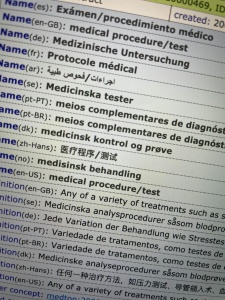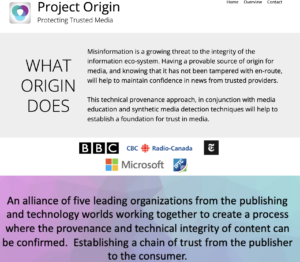Categories
Archives
 Today, IPTC announces the biggest change to the NewsCodes vocabularies in years. Almost 200 terms have been modified in the Media Topics vocabulary, including many “retirements”, trimming the CV down to exactly 1100 terms.
Today, IPTC announces the biggest change to the NewsCodes vocabularies in years. Almost 200 terms have been modified in the Media Topics vocabulary, including many “retirements”, trimming the CV down to exactly 1100 terms.
Overall, three controlled vocabularies have been updated: Content Warning, Content Production Party Role and Media Topic.
The changes to Media Topic CV are the biggest ever, with 9 new concepts, 60 retired concepts and 120 modified concepts, including 79 hierarchy moves.
The NewsCodes Working Group has been working hard on this update for over six months, bringing much-needed clarity to the “economy, business and finance” branch.
As part of the review, the “economic sector” sub-branch has been re-named “products and services”, handle both the companies making products or providing services, and also the products and services themselves.
Specifically, we have changed the following:
- 9 New concepts: business reporting and performance, business restructuring, commercial real estate, residential real estate, podcast, financial service, business service, news industry and diversity, equity and inclusion.
- 60 retired concepts: business finance, accounting and audit, analysts comment, earnings forecast, stock option, licensing agreement, aquaculture, arable farming, livestock farming, viniculture, fertiliser, health and beauty product, inorganic chemical, organic chemical, computer networking, computer security, telecommunication equipment, design and engineering, house building, land price, real estate, beverage, grocery, mail order, non-durable good, kerosene/paraffin, financial and business service, funeral parlour and crematorium, janitorial service, personal finance, personal income, personal service, printing service, wedding service, industrial component, instrument engineering, news agency, newspaper and magazine, online media industry, iron and steel, mining, non-ferrous metal, process industry, distiller and brewer, paper and packaging product, rubber product, soft drinks, textile and clothing, traffic, securities, renewable energy, stock recommendation, buy recommendation, hold recommendation, sell recommendation, hot stock, Internet of Things, capital goods, e-cigarette and commercial building. Most of these have notes attached describing which terms should be used instead of the retired ones.
- 39 name (label) changes: terrorist bombings, stock buyback corporate dividends corporate earnings, business financing, shareholder activity, executive officer, business strategy and marketing, products and services, commercial fishing, plastic, computer and telecommunications hardware, semiconductor and electronic component, software and applications, restoration, online shopping, toy and game, renewable energy, electricity, waste management, auction, consultancy, financial advisory service, personal finance and investment, shipping and postal service, media and entertainment industry, books and publishing, film industry, metal and mineral mining and refining, precious material, beverage and grocery, tobacco and nicotine, casinos and gambling, derivatives, stocks and securities, handicrafts, oil and gas, sales channel and heating and cooling.
- 81 definition changes: cyber crime, war crime, bankruptcy, stock buyback, corporate dividends, corporate earnings, business financing, shareholder activity, stock option, business governance, new product or service, patent, copyright and trademark, products and services, agriculture, commercial fishing, forestry and timber, pharmaceutical, plastic, computing and information technology, computer and telecommunications hardware, semiconductor and electronic component, software and applications, telecommunication service, wireless technology, restoration, clothing, online shopping, luxury good, retail, toy and game, energy and resource, renewable energy, diesel fuel, electricity, natural gas, waste management, water supply, accountancy and auditing, auction, banking, market research, personal finance and investment, rental service, shipping and postal service, defence equipment, heavy engineering, machine manufacturing, shipbuilding, media and entertainment industry, advertising, books and publishing, film industry, music industry, public relations, radio industry, television industry, metal and mineral mining and refining, building material, precious material, beverage and grocery, tobacco and nicotine, tourism and leisure industry, casinos and gambling, hotel and accommodation, restaurant and catering, tour operator, transport, air transport, railway transport, road transport, derivatives, stocks and securities, handicrafts, asset management, railway manufacturing, medical equipment, pet product and service, biofuel, utilities, streaming service and crowdfunding.
Currently, the name and description changes have only been made in English (both en-GB and en-US variants). Other language versions will come soon when their maintainers can make the appropriate changes to their translations.
Changes to Content Warning CV
New terms Drug Use, Fantasy Violence, Flashing Lights, Personally Identifiable Information to match standard terms used in the industry. The “Flashing Lights” term is intended to be used for flagging content that may trigger photosensitive epilepsy, a key accessibility concern by many broadcasters and a legal requirement in some countries.
Label change: Suffering to Upsetting and Disturbing to match industry usage.
Changes to Content Production Party Role CV
New term Distributor. Changed definition of Information Originator.
More information on IPTC Controlled Vocabularies
As always, the Media Topics vocabularies can be viewed in the following ways:
- In a collapsible tree view
- As a downloadable Excel spreadsheet
- On one page on the cv.iptc.org server
- In machine readable formats such as RDF/XML and Turtle using the SKOS vocabulary format. See the cv.iptc.org guidelines document for more detail.
For more information on IPTC NewsCodes in general, please see the IPTC NewsCodes Guidelines.

The IPTC is very happy to announce that it has joined the Steering Committee of Project Origin, one of the industry’s key initiatives to fight misinformation online through the use of tamper-evident metadata embedded in media files.
After working with Project Origin over a number of years, and co-hosting a series of workshops during 2022, the organisation formally invited the IPTC to join the Steering Committee.
Current Steering Committee members are Microsoft, the BBC and CBC / Radio Canada. The New York Times also participates in Steering Committee meetings through its Research & Development department.
“We were very happy to co-host with Project Origin a productive series of webinars and workshops during 2022, introducing the details of C2PA technology to the news and media industry and discussing the remaining issues to drive wider adoption,” says Brendan Quinn, Managing Director of the IPTC.
C2PA, the Coalition for Content Provenance and Authenticity, took a set of requirements from both Project Origin and the Content Authenticity Initiative to create a technical means of associating media files with information on the origin and subsequent modifications of news stories and other media content.
“Project Origin’s aim is to take the ground-breaking technical specification created by C2PA and make it realistic and relevant for newsrooms around the world,” Quinn said. “This is very much in keeping with the IPTC’s mission to help media organisations to succeed by sharing best practices, creating open standards and facilitating collaboration between media and technology organisations.”
“The IPTC is a perfect partner for Project Origin as we work to connect newsrooms through secure metadata,” said Bruce MacCormack, the CBC/Radio-Canada Co-Lead.
The announcement was made at the Trusted News Initiative event held in London today, 30 March 2023, where representatives of the BBC, AFP, Microsoft, Meta and many others gathered to discuss trust, misinformation and authenticity in news media.
Learn more about Project Origin by contacting us or viewing the video below:

IPTC Managing Director Brendan Quinn presented at the European Broadcasting Union’s Data Technology Seminar last week.
The DataTech Seminar, known in previous years as the Metadata Developers Network, brought over 100 technologists together in person in Geneva to discuss topics related to managing data at broadcasters in Europe and around the world.
Brendan spoke on Tuesday 21st March on a panel discussing Artificial Intelligence and the Media. Brendan used the opportunity to discuss IPTC’s current work on “do not train” signals in metadata, and on establishing best practices for how AI tools can embed metadata indicating the origin of their media.
The work of C2PA, Project Origin and Content Authenticity Initiative on addressing content provenance and tamper-evident media was also highlighted by Brendan during the panel discussion, as this relates to the prevalence of “deepfake” content that can be created by generative AI engines.
On Wednesday 22nd March, Brendan spoke in lieu of Paul Kelly, lead of the IPTC Sports Content Working Group about the IPTC SportSchema project. The session was called “IPTC Sport Schema – the next generation of sports data.” An evolution of IPTC’s SportsML standard, IPTC Sport Schema brings our 20 years of experience in sports data markup to the world of Knowledge Graphs and the Semantic Web. The specification is coming close to a version 1, so we were very proud to present it to some of the world’s top broadcasters and industry players.
The IPTC SportSchema site sportschema.org now includes comprehensive documentation of the ontology behind sports data model, examples of how it can be queried using SPARQL, example data files and instance diagrams showing how it can be used to represent common sports such as athletics, soccer, golf and hockey.
We look forward to discussing IPTC Sport Schema much more over the coming months, as we draw close to its general release.
EBU members can watch the full presentation at the EBU.ch site.
Categories
Archives
- February 2026
- January 2026
- December 2025
- November 2025
- October 2025
- September 2025
- August 2025
- July 2025
- June 2025
- May 2025
- April 2025
- March 2025
- February 2025
- January 2025
- December 2024
- November 2024
- October 2024
- September 2024
- August 2024
- July 2024
- June 2024
- May 2024
- April 2024
- March 2024
- February 2024
- December 2023
- November 2023
- October 2023
- September 2023
- August 2023
- July 2023
- June 2023
- May 2023
- March 2023
- February 2023
- January 2023
- December 2022
- November 2022
- October 2022
- September 2022
- August 2022
- July 2022
- June 2022
- May 2022
- April 2022
- March 2022
- February 2022
- January 2022
- December 2021
- November 2021
- October 2021
- September 2021
- August 2021
- July 2021
- June 2021
- May 2021
- April 2021
- February 2021
- December 2020
- November 2020
- October 2020
- September 2020
- August 2020
- July 2020
- June 2020
- May 2020
- April 2020
- March 2020
- February 2020
- December 2019
- November 2019
- October 2019
- September 2019
- July 2019
- June 2019
- May 2019
- April 2019
- February 2019
- November 2018
- October 2018
- September 2018
- August 2018
- July 2018
- June 2018
- May 2018
- April 2018
- March 2018
- January 2018
- November 2017
- October 2017
- September 2017
- August 2017
- June 2017
- May 2017
- April 2017
- December 2016
- November 2016
- October 2016
- September 2016
- August 2016
- July 2016
- June 2016
- May 2016
- April 2016
- February 2016
- January 2016
- December 2015
- November 2015
- October 2015
- September 2015
- June 2015
- April 2015
- March 2015
- February 2015
- November 2014